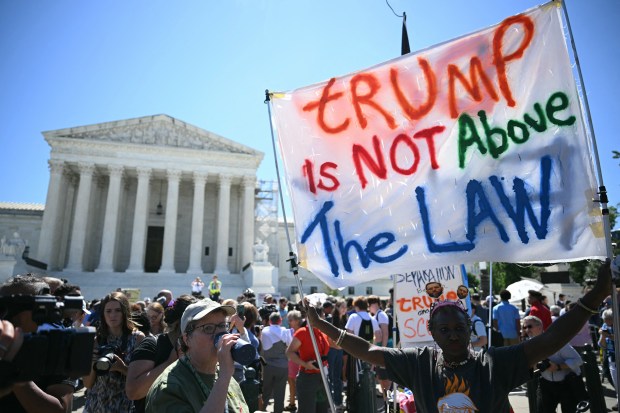For a Supreme Court that places great importance on history and tradition, its decision granting Donald Trump broad immunity is conspicuously indifferent to either factor. Presidents have never enjoyed a presumption that they are permanently exempt from prosecution. But six justices fantasize that without it, the head of the executive branch would be unable to function.
Chief Justice John Roberts, writing for the majority, conjures up the danger “that the President would be chilled from taking the bold and unhesitating action required of an independent Executive.” He warns of “the hesitation to execute the duties of his office fearlessly and fairly that might result when a President is making decisions under a pall of potential prosecution.”
Seriously? Until now, the question was not whether a former president could be held accountable for committing felonies in office. The debate was over whether a sitting president could be indicted — a matter largely resolved by a Department of Justice policy, adopted in 1973, rejecting the option.
For a sitting president to go on trial, the department concluded, could be such a time-consuming distraction that he or she would be unable to perform the essential tasks of the office. As the department said in 2000, “The constitutional structure permits a sitting president to be subject to criminal process only after he leaves office.”
According to this court, however, presidents would be deterred from doing their job unless they know they may violate the nation’s laws without fear of ever being hauled into court.
Past presidents, however, have exercised their broad powers without any assurance that they would not spend their twilight years behind bars. If anything, the prospect of eventual prosecution has been insufficient to prevent them from abusing their powers.
Consider John F. Kennedy, whose FBI engaged in the wiretapping and harassing of the Rev. Martin Luther King Jr. Lyndon Johnson ordered the FBI to place electronic bugs on the campaign plane of his 1964 opponent, Barry Goldwater. FBI Director J. Edgar Hoover, asked later why he agreed, replied, “You do what the president tells you to do.”
Richard Nixon engaged in all sorts of lawless conduct in what we know as the Watergate affair. He obviously didn’t expect to be immune from prosecution, which is why he was more than willing to accept a pardon from his successor, Gerald Ford.
George W. Bush allowed the torture of detainees during his war on terror — in defiance of both U.S. and international law, which categorically forbid it. He might have been prosecuted, but he, too, benefited from the mercy of his successor. “The only person the Obama administration has prosecuted in connection with the torture program is a man who revealed its existence to the media,” Vox noted in 2014.
The Supreme Court’s indifference to historical reality would be bad enough if it were merely an exercise in abstract theorizing. But the Trump example, and the threat of his return to the presidency, makes it grossly irresponsible.
Under Monday’s ruling, presidents have broad exemption for criminal conduct as long as it can be placed in the cavernous category of “official acts.” To give a reelected President Trump that get-out-of-jail free card is like giving a teenage meth head a Glock and a Corvette.
Trump is not reading the court’s opinion as a check on his behavior. He’s reading it as “Dismantling Democracy for Dummies,” a step-by-step guide on how to establish a corrupt autocracy and live happily ever after.
Were Joe Biden as power-mad as Trump, he could take care of him without the bother of an election. Supreme Court Justice Sonia Sotomayor listed some of the consequence-free options available to a president. Among them: “Orders the Navy’s Seal Team 6 to assassinate a political rival? Immune. Organizes a military coup to hold onto power? Immune.”
Trump and his allies might be terrified to grant such prerogatives to Biden, whom his campaign has likened to “a corrupt third-world dictator.”
In fact, they all sleep soundly in the knowledge that this president is constrained by his fundamental belief in American democracy.
Trump, if he regains the White House, will not be constrained by such a belief. And the court has ensured he will not be constrained by fear of being held criminally accountable. He will have unprecedented latitude and no compunction about using it.
Two hundred and forty-eight years ago, Americans vowed that they would no longer be ruled by a monarch. On this Fourth of July, Trump’s accomplices in Congress and on the Supreme Court should send King Charles III a note of apology: “What were we thinking?”
Steve Chapman was a member of the Tribune Editorial Board from 1981 to 2021. His columns, exclusive to the Tribune, appear the first Thursday of every month. He can be reached at stephenjchapman@icloud.com.
Submit a letter, of no more than 400 words, to the editor here or email letters@chicagotribune.com.



